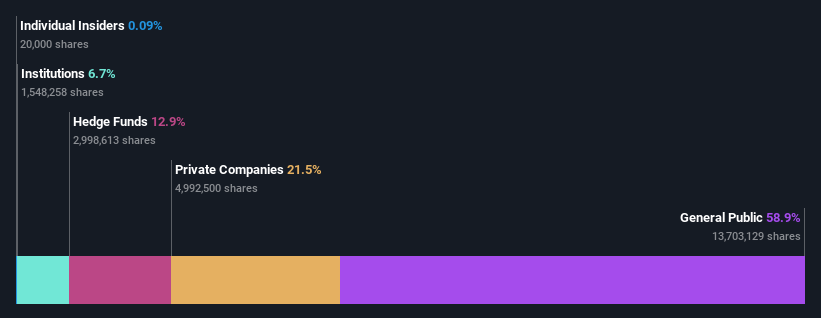What Is The Ownership Structure Like For CF Acquisition Corp. VII (NASDAQ:CFFS)?
A look at the shareholders of CF Acquisition Corp. VII (NASDAQ:CFFS) can tell us which group is most powerful. Insiders often own a large chunk of younger, smaller, companies while huge companies tend to have institutions as shareholders. Companies that have been privatized tend to have low insider ownership.
CF Acquisition VII is a smaller company with a market capitalization of US$231m, so it may still be flying under the radar of many institutional investors. Taking a look at our data on the ownership groups (below), it seems that institutional investors have bought into the company. Let's delve deeper into each type of owner, to discover more about CF Acquisition VII.
View our latest analysis for CF Acquisition VII
What Does The Institutional Ownership Tell Us About CF Acquisition VII?
Institutional investors commonly compare their own returns to the returns of a commonly followed index. So they generally do consider buying larger companies that are included in the relevant benchmark index.
As you can see, institutional investors have a fair amount of stake in CF Acquisition VII. This suggests some credibility amongst professional investors. But we can't rely on that fact alone since institutions make bad investments sometimes, just like everyone does. When multiple institutions own a stock, there's always a risk that they are in a 'crowded trade'. When such a trade goes wrong, multiple parties may compete to sell stock fast. This risk is higher in a company without a history of growth. You can see CF Acquisition VII's historic earnings and revenue below, but keep in mind there's always more to the story.
It looks like hedge funds own 13% of CF Acquisition VII shares. That catches my attention because hedge funds sometimes try to influence management, or bring about changes that will create near term value for shareholders. Cantor Fitzgerald, L.P. is currently the company's largest shareholder with 21% of shares outstanding. Beryl Capital Management LLC is the second largest shareholder owning 7.1% of common stock, and MM Asset Management Inc holds about 5.7% of the company stock.
On studying our ownership data, we found that 9 of the top shareholders collectively own less than 50% of the share register, implying that no single individual has a majority interest.
While it makes sense to study institutional ownership data for a company, it also makes sense to study analyst sentiments to know which way the wind is blowing. Our information suggests that there isn't any analyst coverage of the stock, so it is probably little known.
Insider Ownership Of CF Acquisition VII
While the precise definition of an insider can be subjective, almost everyone considers board members to be insiders. Management ultimately answers to the board. However, it is not uncommon for managers to be executive board members, especially if they are a founder or the CEO.
Most consider insider ownership a positive because it can indicate the board is well aligned with other shareholders. However, on some occasions too much power is concentrated within this group.
Our data suggests that insiders own under 1% of CF Acquisition Corp. VII in their own names. However, it's possible that insiders might have an indirect interest through a more complex structure. It appears that the board holds about US$198k worth of stock. This compares to a market capitalization of US$231m. Many tend to prefer to see a board with bigger shareholdings. A good next step might be to take a look at this free summary of insider buying and selling.
General Public Ownership
The general public -- including retail investors -- own 59% of CF Acquisition VII. This size of ownership gives investors from the general public some collective power. They can and probably do influence decisions on executive compensation, dividend policies and proposed business acquisitions.
Private Company Ownership
We can see that Private Companies own 21%, of the shares on issue. It might be worth looking deeper into this. If related parties, such as insiders, have an interest in one of these private companies, that should be disclosed in the annual report. Private companies may also have a strategic interest in the company.
Next Steps:
While it is well worth considering the different groups that own a company, there are other factors that are even more important. Take risks for example - CF Acquisition VII has 3 warning signs (and 2 which shouldn't be ignored) we think you should know about.
Of course this may not be the best stock to buy. So take a peek at this free free list of interesting companies.
NB: Figures in this article are calculated using data from the last twelve months, which refer to the 12-month period ending on the last date of the month the financial statement is dated. This may not be consistent with full year annual report figures.
Have feedback on this article? Concerned about the content? Get in touch with us directly. Alternatively, email editorial-team (at) simplywallst.com.
This article by Simply Wall St is general in nature. We provide commentary based on historical data and analyst forecasts only using an unbiased methodology and our articles are not intended to be financial advice. It does not constitute a recommendation to buy or sell any stock, and does not take account of your objectives, or your financial situation. We aim to bring you long-term focused analysis driven by fundamental data. Note that our analysis may not factor in the latest price-sensitive company announcements or qualitative material. Simply Wall St has no position in any stocks mentioned.

 Yahoo Finance
Yahoo Finance 
